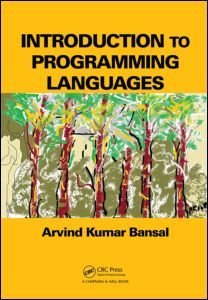Description
Introduction to Programming Languages
Author: Bansal Arvind Kumar
Language: English
Subjects for Introduction to Programming Languages:
Keywords
Object Oriented Programming; Recursive Data Structures; programming language concepts at an abstract level; Control Abstractions; programming language design and implementation; Address Space; concurrent programming constructs; Set S1; mobile computing models; Called Procedure; implementation model and behavior of programming paradigms at abstract levels; Programming Paradigm; programming language constructs at a paradigm level; Memory Location; data structures and discrete structures in programming language theory; Control Stack; web and multimedia programming; Soware Maintenance; high-productivity programming on massive parallel computers; Dynamic Memory Management; agent-based programming; Functional Programming Paradigm; Java; C++; C#; Ada 2012; Ruby; Perl; Python; Scala; Haskell; Nonlocal Variables; imperative; functional; logic; and object-oriented programming; Le Hand Side; distributed computing; Exception Handler; undergraduate course in programming; Functional Programming Languages; Object Oriented Programming Paradigm; Data Entity; Functional Languages; Destructive Update; Virtual Machines; Von Neumann Machine; Actual Parameter; Concurrent Programming; Abstract Syntax
105.47 €
In Print (Delivery period: 15 days).
Add to cartPublication date: 02-2014
Support: Print on demand
Publication date: 06-2017
· 17.8x25.4 cm · Hardback
Description
/li>Contents
/li>Biography
/li>
In programming courses, using the different syntax of multiple languages, such as C++, Java, PHP, and Python, for the same abstraction often confuses students new to computer science. Introduction to Programming Languages separates programming language concepts from the restraints of multiple language syntax by discussing the concepts at an abstract level.
Designed for a one-semester undergraduate course, this classroom-tested book teaches the principles of programming language design and implementation. It presents:
- Common features of programming languages at an abstract level rather than a comparative level
- The implementation model and behavior of programming paradigms at abstract levels so that students understand the power and limitations of programming paradigms
- Language constructs at a paradigm level
- A holistic view of programming language design and behavior
To make the book self-contained, the author introduces the necessary concepts of data structures and discrete structures from the perspective of programming language theory. The text covers classical topics, such as syntax and semantics, imperative programming, program structures, information exchange between subprograms, object-oriented programming, logic programming, and functional programming. It also explores newer topics, including dependency analysis, communicating sequential processes, concurrent programming constructs, web and multimedia programming, event-based programming, agent-based programming, synchronous languages, high-productivity programming on massive parallel computers, models for mobile computing, and much more. Along with problems and further reading in each chapter, the book includes in-depth examples and case studies using various languages that help students understand syntax in practical contexts.
These books may interest you

Compiler DesignVirtual Machines 49.57 €



